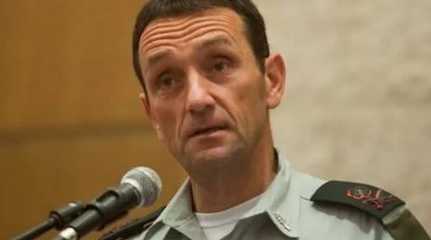
25 Feb 2023; MEMO: The political conflict and social rift due to the government's plan to weaken the judiciary and start passing legislation in the Knesset have reached the ranks of the Israeli occupation army on a relatively large scale, prompting Chief of General Staff of the Israeli Defense Forces Herzi Halevi to issue a warning in this regard.
According to a report by Haaretz on Friday, the main concerns of the Israeli General Staff now are not the escalating security tension in the Palestinian territories occupied in 1967, especially the West Bank and Jerusalem, nor the Iranian "nuclear threat", but the presence of: "Initial indications of a crisis in the reserve forces, especially the Israel Air Force, sparked by the ruling coalition's governmental coup."
The newspaper noted: "Members of reserve aircrews are increasingly discussing the possible refusal to comply with which the Netanyahu government is fomenting. There is an intensifying dialogue among reserve air force crews about the possibility of refusing to comply with call-ups or with certain directives, in solidarity with the protest."
Most of Israel's military power is focused on the Air Force and intelligence services.
The newspaper pointed out: "Even more than other IDF branches, the IAF relies on a large percentage of reservists, particularly in the aircrews. Over time, a decline in the willingness of reserve pilots and navigators to report for duty will affect the force's professional fitness and is liable to have a detrimental effect on the IDF's might. This apparently led IDF Chief of Staff Herzl Halevi, to comment on the issue publicly for the first time Thursday. The General Staff also fears the reluctance to serve will spread to important MI units."
The calls for refusal to serve in the reserve forces have not faded, despite the Israeli right-wing's efforts to downplay it, according to the newspaper. Channel 13 television station reported on Wednesday that a brigadier general in the Air Force reserves asked to be released from his position as one of the commanders of the operations room at the headquarters of the Ministry of Security in Tel Aviv, explaining that he could not continue in light of legislation to change the nature of the government in Israel.
The newspaper mentioned that this officer was "a long-time career officer" and that his: "Assignments have included command of two large IAF bases. He's known for being independent-minded and opinionated, but that's standard for the Air Force. That is apparently why other high-ranking reserve officers told their commanders discreetly that they would take the same step."
READ: Israel Army Chief warns against soldiers' involvement in political struggle over judicial overhaul
The newspaper quoted pilots and co-pilots in the reserve saying: "Crew members increasingly seek to postpone reporting for training days in their squadrons. Every IAF squadron has a WhatsApp group for the reservists, who constitute a considerable portion of the aircrews. The atmosphere in the groups is seething, and the calls for refusal to serve are spreading like wildfire. Few members are ready to take action, but there is a lot of soul-searching and a great deal of charged back-and-forth."
"A recurrent argument made in the chats is that new laws may make reserve pilots more vulnerable to legal action abroad. The pilots and navigators understand well remarks made this week by top defence establishment legal advisers in the Knesset Constitution, Law and Justice Committee. If the judiciary is weakened, the lawyers said, the state's claim to robust investigatory and legal mechanism that makes external intervention unnecessary will also be weakened," reported Haaretz, adding: "In that case, the pilots could be first in the sights of the court in The Hague."




